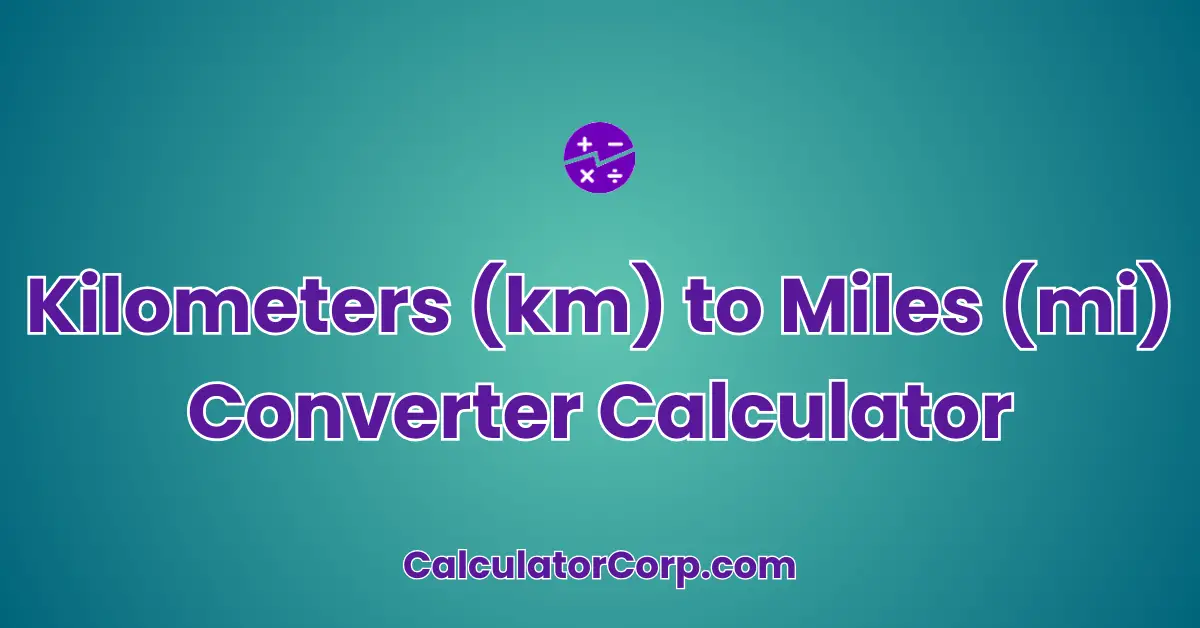A kilometers (km) to miles (mi) calculator is a tool designed to help individuals convert distances from kilometers to miles effortlessly. This calculator is particularly useful for travelers, students, scientists, and anyone dealing with international measurements.
Kilometers to Miles & Miles to Kilometers Converter
By providing quick and accurate conversions, it aids in planning trips, completing assignments, or conducting research. Users can save time and reduce errors by using this calculator to obtain precise results without manual computation.
How to Use kilometers (km) to miles (mi) Calculator?
To use the kilometers (km) to miles (mi) calculator effectively, follow these simple steps:
- Field Explanation: Enter the distance in kilometers into the input field. Ensure the number is valid and accurate to get a precise conversion.
- Result Interpretation: Once calculated, the result will display in miles. For example, 100 km equals 62.137 miles.
- Tips: Avoid common mistakes such as entering non-numeric values. Remember, rounding might affect outcomes; for more accuracy, use more decimal places if necessary.
Backend Formula for the kilometers (km) to miles (mi) Calculator
The formula used to convert kilometers to miles is straightforward: miles = kilometers × 0.621371.
- Step-by-Step Breakdown: Multiply the distance in kilometers by the conversion factor (0.621371). This factor represents the equivalent of one kilometer in miles.
- Illustrative Example: For instance, to convert 10 kilometers to miles, multiply 10 by 0.621371, resulting in 6.21371 miles.
- Common Variations: While the conversion factor remains constant, some might use a rounded-off version (0.62) for quick estimates, though this may affect precision.
Step-by-Step Calculation Guide for the kilometers (km) to miles (mi) Calculator
Here’s how to perform the conversion manually:
- User-Friendly Breakdown: The conversion involves a simple multiplication of the kilometer value by the fixed conversion factor (0.621371).
- Multiple Examples: Example 1: Converting 50 km results in 31.06855 miles. Example 2: 120 km converts to 74.56452 miles.
- Common Mistakes to Avoid: Ensure all inputs are numeric and double-check calculations, especially when approximating.
Real-Life Applications and Tips for Using the kilometers (km) to miles (mi) Calculator
The kilometers (km) to miles (mi) calculator is invaluable in various scenarios:
- Short-Term vs. Long-Term Applications: Use it for immediate travel planning or long-term study and research projects.
- Example Professions or Scenarios: Ideal for logistics managers, travel bloggers, or educators dealing with international data.
- Practical Tips: Gather accurate data before calculation, consider rounding effects, and use results for precise planning and budgeting.
kilometers (km) to miles (mi) Case Study Example
Meet Jane, a travel enthusiast planning a cross-country trip. Before booking her accommodation, she uses the kilometers to miles calculator to determine travel distances and times accurately. At each stage of her journey, like planning fuel stops and estimating arrival times, this tool proves invaluable. By converting kilometers to miles for each leg of her trip, Jane ensures she stays on schedule and budget. Other users, like delivery drivers or cyclists, might find similar benefits in different scenarios.
Pros and Cons of Using the kilometers (km) to miles (mi) Calculator
Understanding the advantages and limitations of this tool is crucial for optimal use:
- List of Pros:
Time Efficiency: Quickly converts values without manual computation errors, saving hours of work.
Enhanced Planning: Supports informed decision-making, ensuring accurate travel or study data.
- List of Cons:
Over-Reliance: Relying too heavily on calculator results without understanding the underlying math can lead to errors.
Estimation Errors: Rounding can affect precision; consider other methods or confirm with professionals for critical decisions.
- Mitigating Drawbacks: Cross-reference results with other tools or manual calculations to ensure accuracy.
Example Calculations Table
| Kilometers | Miles |
|---|---|
| 10 | 6.21371 |
| 50 | 31.06855 |
| 100 | 62.1371 |
| 150 | 93.20565 |
| 200 | 124.2742 |
Table Interpretation: Notice how increasing kilometers consistently affects the miles, highlighting the linear relationship between the two measurements.
Glossary of Terms Related to kilometers (km) to miles (mi)
- Kilometer (km): A unit of length in the metric system, equal to 1,000 meters. Commonly used in most countries for measuring distances.
- Mile (mi): A unit of length in the imperial system, used primarily in the United States and the United Kingdom. One mile equals 1.60934 kilometers.
- Conversion Factor: A numerical factor used to multiply or divide when converting from one unit to another. In this case, 0.621371 for km to mi.
Frequently Asked Questions (FAQs) about the kilometers (km) to miles (mi)
- Why should I use a km to mi calculator?
Using a calculator ensures accuracy and saves time compared to manual calculations, especially when dealing with large numbers or frequent conversions.
- Is the conversion factor always the same?
Yes, the standard conversion factor from kilometers to miles is 0.621371, ensuring consistency across calculations.
- Can I use this calculator for small distances?
Absolutely, the calculator is suitable for both small and large distances, providing precise results regardless of the input size.
- How does rounding affect my results?
Rounding can introduce minor errors, particularly for very precise requirements. Consider keeping more decimal places for sensitive calculations.
- What if I make a mistake entering data?
Simply use the reset button to clear the inputs and start over, ensuring the correct data is entered for accurate results.
Further Reading and External Resources
- Metric Conversions: Kilometers to Miles – A comprehensive resource on distance conversions with additional tools and charts.
- Wikipedia: Kilometre – An in-depth article on the kilometer, its history, and usage globally.
- Wikipedia: Mile – Detailed exploration of the mile, including its various forms and historical context.

